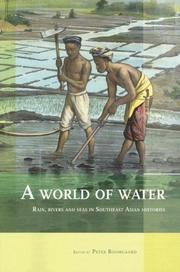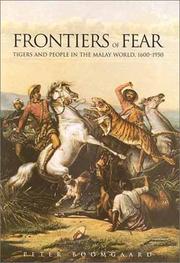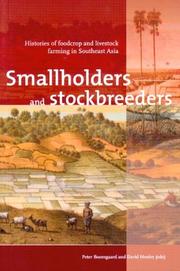| Listing 1 - 10 of 16 | << page >> |
Sort by
|

ISBN: 906718294X 9004254013 9789004254015 9789067182942 Year: 2007 Publisher: Leiden : KITLV Press,
Abstract | Keywords | Export | Availability | Bookmark
 Loading...
Loading...Choose an application
- Reference Manager
- EndNote
- RefWorks (Direct export to RefWorks)
Water, in its many guises, has always played a powerful role in shaping Southeast Asian histories, cultures, societies and economies. This volume, the rewritten results of an international workshop, with participants from eight countries, contains thirteen essays, representing a broad range of approaches to the study of Southeast Asia with water as the central theme. As it was exposed to the sea, the region was more accessible to outside political, economic and cultural influences than many landlocked areas. Easy access through sea routes also stimulated trade from an early age. However, the same easy access made Southeast Asia vulnerable to political control by strong outsiders. The sea is, moreover, a source of food, but also of many hazards. At the same time, Southeast Asian societies and cultures are confronted with and permeated by 'water from heaven' in the form of rain, flash floods, irrigation water, water in rivers, brooks and swaps, water-driven power plants, and pumped or piped water, in addition to water as a carrier of sewage and pollution. Finally, the volume deals with the role of water in classification systems, beliefs, myths, illness and healing. Full Text (Open Access)
Ecohydrology -- Southeast Asia -- History. --- Water -- Pollution -- Southeast Asia. --- Water -- Social aspects -- Southeast Asia. --- Water in agriculture -- Southeast Asia. --- Ecohydrology --- Water --- Water in agriculture --- Earth & Environmental Sciences --- Ecology --- History --- Social aspects --- Pollution --- History. --- Eco-hydrology --- Hydrology --- Agriculture --- Water-supply, Agricultural --- Water-supply, Rural --- Aquatic ecology --- Ecohydrology. --- Water in agriculture. --- Pollution. --- Social aspects. --- Southeast Asia. --- Aquatic pollution --- Fresh water --- Freshwater pollution --- Inland water pollution --- Lake pollution --- Lakes --- Reservoirs --- River pollution --- Rivers --- Stream pollution --- Water contamination --- Water pollutants --- Waste disposal in rivers, lakes, etc. --- Asia, Southeast --- Asia, Southeastern --- South East Asia --- Southeastern Asia --- rain --- fishery --- regen --- geschiedenis --- indonesie --- ziektes --- zee --- visserij --- philippines --- history --- indonesia --- piraterij --- cosmologie --- southeast asia --- water irrigatie systemen --- philipijnen --- watervoorraad --- rivieren --- malaysia --- water supply --- rivers --- cosmology --- piracy --- sea --- water pollution --- water --- water irrigation systems --- diseases --- maleisie --- watervervuiling --- Indonesia --- Irrigation --- Southeast Asia

ISBN: 1281741027 9786611741020 0300127596 9780300127591 0300085397 9780300085396 9781281741028 661174102X Year: 2001 Publisher: New Haven, Conn. Yale University Press
Abstract | Keywords | Export | Availability | Bookmark
 Loading...
Loading...Choose an application
- Reference Manager
- EndNote
- RefWorks (Direct export to RefWorks)
For centuries, reports of man-eating tigers in Indonesia, Malaysia, and Singapore have circulated, shrouded in myth and anecdote. This fascinating book documents the "big cat"-human relationship in this area during its 350-year colonial period, re-creating a world in which people feared tigers but often came into contact with them, because these fierce predators prefer habitats created by human interference. Peter Boomgaard shows how people and tigers adapted to each other's behavior, each transmitting this learning from one generation to the next. He discusses the origins of stories and rituals about tigers and explains how cultural biases of Europeans and class differences among indigenous populations affected attitudes toward the tigers. He provides figures on their populations in different eras and analyzes the factors contributing to their present status as an endangered species. Interweaving stories about Malay kings, colonial rulers, tiger charmers, and bounty hunters with facts about tigers and their way of life, the book is an engrossing combination of environmental and micro history.
Tiger --- Human-animal relationships --- Animal-human relationships --- Animal-man relationships --- Animals and humans --- Human beings and animals --- Man-animal relationships --- Relationships, Human-animal --- Animals --- Leo tigris --- Panthera tigris --- Tigers --- Panthera --- History.
Book
ISBN: 9789004487246 9789067181631 Year: 2000 Publisher: Leiden; Boston : BRILL
Abstract | Keywords | Export | Availability | Bookmark
 Loading...
Loading...Choose an application
- Reference Manager
- EndNote
- RefWorks (Direct export to RefWorks)
The principal cause of the 1930s depression in Southeast Asia lay outside the region-through a sharp contraction in demand for the region's major commodity exports. But it had important internal causes, too: an oversupply of primary commodities and an increasing scarcity of new agricultural land leading to higher rents and lower wages, rising indebtedness and increasing landlessness. This work thoroughly analyses the pre-war depression. It also looks at the changes in the basic structures of the economies of Southeast Asia that were of long-term importance, such as the role of the state in the economy. The authors also draw similarities and contrasts between the 1930s depression and the 1990s Asian crisis. Contributors are Peter Boomgaard, Anne Booth, Pierre Brocheux, Ian Brown, William G. Clarence-Smith, Daniel F. Doeppers, Paul H. Kratoska, J. Thomas Lindblad, Sompop Manarungsan, S. Nawiyanto, Irene Norlund, Jeroen Touwen, and Willem Wolters. Co-published with ISEAS, Singapore.
Economic development --- Economic history --- Economical crises
Book
ISBN: 9789004454392 9789067181242 Year: 1998 Publisher: Leiden; Boston : Brill
Abstract | Keywords | Export | Availability | Bookmark
 Loading...
Loading...Choose an application
- Reference Manager
- EndNote
- RefWorks (Direct export to RefWorks)
Too much of what has so far passed for the 'historical background' to Indonesia's environmental problems has consisted of little more than thinly disguised backward projections of modern trends. The writers in this volume report on their own pioneer journeys into the paper landscapes of the colonial literature and archives in search of the real environmental history of Indonesia.
Economic history --- Human ecology --- Landscape changes --- History
Book
ISBN: 9004487247 9067181633 Publisher: BRILL
Abstract | Keywords | Export | Availability | Bookmark
 Loading...
Loading...Choose an application
- Reference Manager
- EndNote
- RefWorks (Direct export to RefWorks)
Book
ISBN: 9789812308467 9789812308474 Year: 2009 Publisher: Singapore Institute of Southeast Asian Studies
Abstract | Keywords | Export | Availability | Bookmark
 Loading...
Loading...Choose an application
- Reference Manager
- EndNote
- RefWorks (Direct export to RefWorks)
Digital
ISBN: 9789812308474 Year: 2009 Publisher: Singapore Institute of Southeast Asian Studies
Abstract | Keywords | Export | Availability | Bookmark
 Loading...
Loading...Choose an application
- Reference Manager
- EndNote
- RefWorks (Direct export to RefWorks)
Digital
ISBN: 9789812305077 Year: 2000 Publisher: Pasir Panjang, Singapore Institute of Southeast Asian Studies
Abstract | Keywords | Export | Availability | Bookmark
 Loading...
Loading...Choose an application
- Reference Manager
- EndNote
- RefWorks (Direct export to RefWorks)
Book
ISBN: 9812308474 9812308466 Year: 2009 Publisher: Singapore : Institute of Southeast Asian Studies,
Abstract | Keywords | Export | Availability | Bookmark
 Loading...
Loading...Choose an application
- Reference Manager
- EndNote
- RefWorks (Direct export to RefWorks)
Credit and debt are practical concerns of all times and places. They are also increasingly important topics in economic history and the social sciences, from Marcel Mauss and the anthropology of the gift to the urgent quest for understanding of today's global credit crunch. This volume brings together eight essays on credit and debt in the history of Indonesia, where for centuries debt and debt bondage played central roles in the organization of society, and where efforts to combat 'usury' and free peasants from indebtedness were central to the ethical and nationalist movements of the late colonial period. Topics range from the inscriptions of ninth-century Java to the first global financial crisis in 1930, and from Islamic laws against the charging of interest to the role of Chinese temples and Dutch church charities as credit providers. The history of credit and debt in Indonesia is examined from a wide variety of perspectives - legal, institutional, and cultural as well as economic. Attention is paid to parallels and contrasts with more recent developments, including the Asian financial crisis of 1997 and Indonesia's rise to fame as a pioneer of the current global microfinance revolution.

ISBN: 9789004487710 9789067182256 Year: 2004 Publisher: Leiden; Boston : BRILL
Abstract | Keywords | Export | Availability | Bookmark
 Loading...
Loading...Choose an application
- Reference Manager
- EndNote
- RefWorks (Direct export to RefWorks)
Historians of Southeast Asia have traditionally preferred to write about politics and culture rather than economics and ecology, and where they have looked at the history of agriculture they have most often concentrated on cash crops like sugar, coffee and rubber which figure prominently in colonial records. Smallholders and stockbreeders , by contrast, provides a rare survey of the history of foodcrop farming, and a unique look at the history of animal husbandry, in the Southeast Asian region. Thirteen contributions by an international selection of expert authors cover topics ranging from the agricultural economy of precolonial Java to the growth of rice production in the Mekong Delta since 1950, and from the breeding of horses on the northern borderlands of mainland Southeast Asia to the production and consumption of beef in the Philippines. New light is shed on old questions regarding the directions in which Southeast Asian agriculture has evolved over the centuries, and new questions raised regarding the cultural, demographic, economic and political determinants of farming practices. While the geographical and chronological scales of analysis vary, most chapters deal with relatively large areas and with developments over periods of 100 years or more. Besides production for subsistence, commercial aspects of livestock and foodcrop farming are also given due attention and prove to have been important in many parts of the region from very early periods. Smallholders and stockbreeders is essential reading for anyone interested in the agricultural history of Southeast Asia, whether for its own sake, or in connection with other aspects of regional history, or for purposes of comparison with other parts of the world.
Agriculture --- Livestock --- History
| Listing 1 - 10 of 16 | << page >> |
Sort by
|

 Search
Search Feedback
Feedback About UniCat
About UniCat  Help
Help News
News